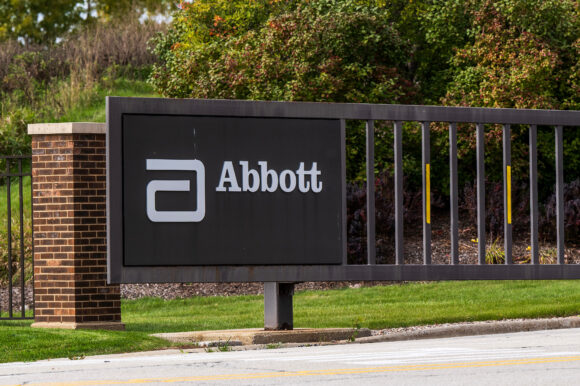Abbott Laboratories hid the risks of its premature-infant formula causing a potentially fatal bowel disease from parents even though company officials acknowledged the peril in internal documents, a lawyer told a Missouri jury.
The company was accused of putting profits over safety by an attorney for the mother of a premature baby girl who developed necrotizing enterocolitis, or NEC, and suffered brain damage after being fed Abbott’s Similac Special Care 24, a cow’s milk-based formula. The trial that kicked off this week in state court in St. Louis is the first of more than 1,000 such claims against Abbott and other formula makers to be presented to a jury.
Abbott officials didn’t mention the NEC risks on the product label and didn’t inform parents that their children could face brain damage or death from being fed the formula, Jake Plattenberger, Margo Gill’s lawyer, said Tuesday in opening statements that were broadcast on Courtroom View Network. He said Abbott spends more than $100 million a year marketing the product.
“It’s okay to market your product, but you have to tell people the truth, and Abbott never did that,” Plattenberger said.
In Abbott’s defense, a lawyer for the company argued that the formula doesn’t cause NEC and that Gill’s baby had pre-existing health issues.
Abbott and Enfamil-formula maker Reckitt Benckiser Group Plc face more than 1,000 suits in courts across the US accusing the companies of failing to warn parents about NEC risks. In March, an Illinois jury ordered a unit of UK-based Reckitt to pay $60 million to the family of a premature baby that died after being fed its cow’s milk-based product. Reckitt’s shares plunged 15% in the wake of the verdict. The company said at the time it would appeal.
St. Louis courts are considered to be plaintiff-friendly and have produced large verdicts in the past. In 2019, a St. Louis jury awarded 20 women $4.7 billion in damages against Johnson & Johnson over claims its baby powders caused their cancers.
“If I were the head of Abbott, I absolutely would not want to try this case in that particular venue,” said Carl Tobias, a University of Richmond professor who teaches about mass-tort law. “It’s fairly well-known that judges and juries in St. Louis tend to be inclined toward plaintiffs. I can’t think of a worse place for a company to try its first case.”
Holly Froum, a Bloomberg Intelligence analyst who has been following the formula litigation, said she expects about 3,000 cases to be filed and manufacturers may face as much as $1.5 billion in exposure.
Lawyers for families with premature babies allege Abbott knew for at least 15 years — and never disclosed the threat — that premature infants fed their Similac Special Care product were at higher risk of developing NEC than those who were fed breast milk from donors.
James Hurst, Abbott’s lead defense lawyer, told jurors that Gill’s daughter, Robynn Davis, had a host of medical issues when she was born in 2021 at just 26 weeks and developed NEC before “she had a single drop” of Similac Special Care.
He said Abbott’s formula has been on the market for 45 years and is backed by research showing it doesn’t cause NEC. He said that breast milk also has been found to cause NEC in some babies.
Hurst also defended Abbott’s marketing of the formula, saying that because it’s not an over-the-counter product, the company focused on educating doctors and hospital staff about its risks and not parents.
The case is Gill v. Abbott, 2322-CC01251, Missouri 22nd Judicial Circuit (St. Louis).
Photo: The Abbott Laboratories headquarters in Illinois. Photographer: Christopher Dilts/Bloomberg
Was this article valuable?
Here are more articles you may enjoy.



 Allstate CEO Wilson Takes on Affordability Issue During Earnings Call
Allstate CEO Wilson Takes on Affordability Issue During Earnings Call  AIG’s Zaffino: Outcomes From AI Use Went From ‘Aspirational’ to ‘Beyond Expectations’
AIG’s Zaffino: Outcomes From AI Use Went From ‘Aspirational’ to ‘Beyond Expectations’  How One Fla. Insurance Agent Allegedly Used Another’s License to Swipe Commissions
How One Fla. Insurance Agent Allegedly Used Another’s License to Swipe Commissions  AIG Underwriting Income Up 48% in Q4 on North America Commercial
AIG Underwriting Income Up 48% in Q4 on North America Commercial 

